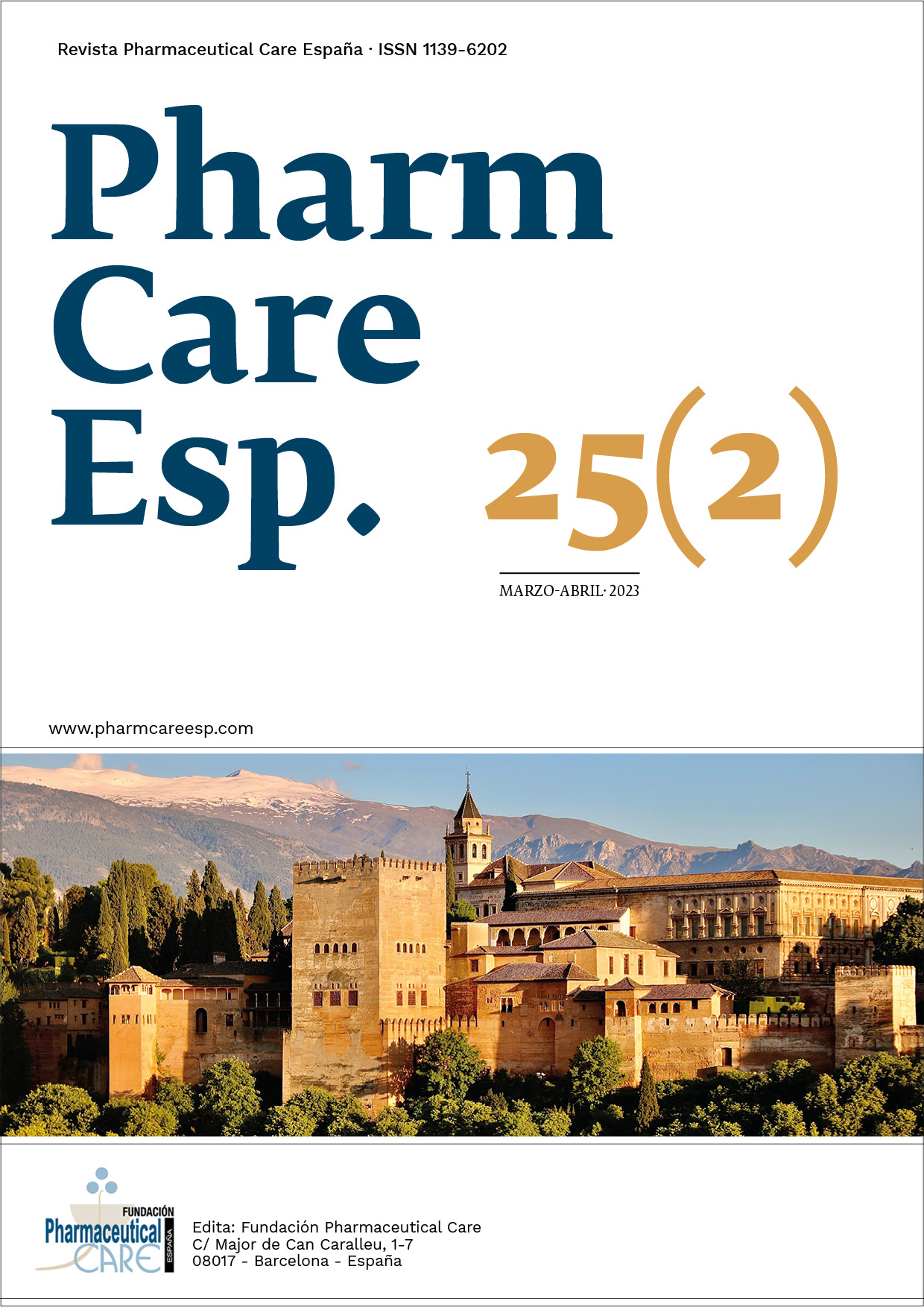Pharmaceutical Care for HIV patients on treatment with Dolutegravir and Lamivudine
DOI:
https://doi.org/10.60103/phc.v25i2.796Keywords:
Pharmaceutical care; HIV; adherence; dolutegravir/lamivudineAbstract
Introduction: According to the World Health Organization, Human Immunodeficiency Virus (HIV) continues being one of the world's major public health problems. Currently, the importance of adherence to treatment continues being the focus of attention of health professionals. Lack of adherence is a major economic and health problem.
Method: This study focuses on the pharmaceutical care service performed on all HIV patients (naive and non-naive) on treatment with the coformulated tablet dolutegravir/lamivudine (DTG/3TC) from its commercialization in July 2019 until May 2021. Variables studied: sex, age, adherence, viral load, CD4 lymphocyte count, previous antiretroviral therapy (ART) in non-naïve patients, concomitant treatments, interactions, the reason that led to the change of ART in non-naïve patient and the adverse effects developed.
Results: In the first interview with the pharmacist in the pharmaceutical care service, five fundamental aspects are discussed: adherence, adverse effects, concomitant treatments and/or herbal products, interactions and reason for changing antiretroviral drugs in non-naive patients. 62 patients started treatment with DTG/3TC: 24.1% (15/62) naive and 75.8% (47/62) no naive. 100% of naive patients were highly adherent, only 6.4% of pre-treated patients were identified as non-adherent. Only one contraindication was found: hypericum.
Conclusions: Patients are highly adherent, the treatment is effective and safe. The pharmaceutical care service is carried out efficiently. We are aware of our patients' adherence and carry out close pharmacotherapeutic monitoring.
Downloads
References
Foro de Atención Farmacéutica-Farmacia Comunitaria. Guía práctica para los Servicios Profesionales Farmacéuticos Asistenciales en la Farmacia Comunitaria. 1ª ed. Madrid: Consejo General de Colegios Oficiales de Farmacéuticos; 2019.
Organización mundial de la Salud. Infección por el VIH. OMS. 2021 [acceso 9 de octubre 2022]. Disponible en: https://www.who.int/es/news-room/fact-sheets/detail/hiv-aids
Grupo de expertos de la Sociedad Española de Farmacia Hospitalaria y del Grupo de Estudio de Sida (GeSIDA). Desprescripción farmacológica de la terapia no antirretroviral en pacientes con infección por VIH. 2018 [acceso 19 de agosto de 2022]. Disponible en: https://gesida-seimc.org/wp-content/uploads/2019/03/15_DESPRESCRIPCION_FARMACOLOGICA_TERAPIA_NO_ANTIRRETROVIRAL_EN_PACIENTES_CON_INFECCION_POR_VIH.pdf
Panel de expertos de GeSIDA y plan nacional sobre el sida. Documento de consenso para mejorar la adherencia a la farmacoterapia en pacientes con infección por el virus de la inmunodeficiencia humana en tratamiento antirretroviral. 2020 [acceso 15 de octubre de 2022]. Disponible en: https://gesida-seimc.org/wp-content/uploads/2020/04/GUIA_GESIDA_febrero_2020_Adherencia.pdf
Grupo de expertos de la Secretaría del Plan Nacional sobre el Sida (SPNS), Grupo de Estudio de Sida (GeSIDA) y Sociedad Española de Farmacia Hospitalaria (SEFH). Documento de consenso sobre el sida respecto al tratamiento antirretroviral en adultos infectados por el virus de la inmunodeficiencia humana. Madrid. 2022 [acceso 15 de octubre de 2022]. Disponible en: https://gesida-seimc.org/wp-content/uploads/2023/01/GuiaGeSIDAPlanNacionalSobreElSidaRespectoAlTratamientoAntirretroviralEnAdultosInfectadosPorElVirusDeLaInmunodeficienciaHumanaActualizacionEnero2022.pdf
Trotta MP, Ammassari A, Melzi S, Zaccarelli M, Ladisa N, SighinolfiL. Treatment-related factors and highly active antiretroviral therapy adherence. J Acquir Immune Defic Syndr. 2002; 31(S3):128- 31. doi: 10.1097/00126334-200212153-00008.
García F, Álvarez M, Bernal C, Chueca N, Guillot V. Diagnóstico de laboratorio de la infección por el VIH, del tropismo viral y de las resistencias a los antirretrovirales. Enfermedades infecciosas y microbiología clínica. 2011; 29 (4): 297-307. doi: 10.1016/j.eimc.2010.12.006
Stone VE, Hogan JW, Schuman P, et al. Antiretroviral regimen complexity, self-reported adherence, and HIV patients’ understanding of their regimens: survey of women in the HER study. J Acquir Immune Defic Syndr. 2001; 28 (2):124–31. doi: 10.1097/00042560-200110010-00003
Clay PG, Nag S, Graham CM, Narayanan S. Meta-Analysis of Studies Comparing Single and Multi-Tablet Fixed Dose Combination HIV Treatment Regimens. Medicine. 2015; 94 (42): e1677. doi: 10.1097/MD.0000000000001677.
Dirección general de Salud Pública y sistemas autonómicos de vigilancia epidemiológica. Vigilancia epidemiológica del VIH y SIDA en España 2021. Madrid. 2022 [acceso 20 de octubre de 2022]. Disponible en: https://www.isciii.es/QueHacemos/Servicios/VigilanciaSaludPublicaRENAVE/EnfermedadesTransmisibles/Documents/VIH/informes%20de%20vigilancia%20VIH%20y%20sida%20anteriores/Informe%20VIH_SIDA_2022_CCAA.pdf
Joly V, Burdet C, Landman R, et al. Dolutegravir and lamivudine maintenance therapy in HIV-1 virologically suppressed patients: results of the ANRS 167 trial (LAMIDOL). J Antimicrob Chemother. 2019; 74:739-45. doi: 10.1093/jac/dky467.
Taiwo BO, Marconi VC, Berzins B, et al. Dolutegravir plus lamivudine maintains human immunodeficiency virus-1 suppression through week 48 in a pilot randomized trial. Clin Infect Dis. 2018; 66(11):1794-97. doi: 10.1093/cid/cix1131.
Bertoldo P, Paraje MG. Intervenciones farmacéuticas: desarrollo e implementación metodológica a partir de la evaluación de dos cohortes. Ars Pharm. 2015; 56(3):149-153. doi: org/10.4321/S2340-98942015000300003.
Ortego C, Huedo-Medina TB, Vejo J, Llorca FJ. Adherence to highly active antiretroviral therapy in Spain: A meta-analysis. Gac Sanit. 2011; 25(4): 282-289. doi: 10.1016/j.gaceta.2010.10.016.
Mendoza-Aguilera M, Ferrando Piqueres R, Álvarez Martin T, Pascual Marmaneu, Lñana Granell C. Adherencia al tratamiento antiretroviral en pacientes VIH: todavía queda mucho por hacer. Ofil·Ilaphar. 2018, 28(3):203-210.
Notario Dongil C, Gómez Llunch MT, Marcos de la Torre A, Proy Vega B. Adherencia al tratamiento antiretroviral pacientes VIH. Revista multidisciplinar del SIDA [revista en Internet]. 2022 [acceso 23 de octubre de 2022]; 10 (26): 7-13. Disponible en: https://www.revistamultidisciplinardelsida.com/adherencia-al-tratamiento-antirretroviral-en-pacientes-vih/
Dilla T, Valladares A, Lizán L, Sacristán JA. Adherencia y persistencia terapéutica: causas, consecuencias y estrategias de mejora. Atención primaria. 2009; 41 (6): 242-348. doi: 10.1016/j.aprim.2008.09.031.
Pedrol E, Viciana P, Arranz A, Pasquau J, Deig E, Tasias M, et al. Causas que justifican el cambio del tratamiento antirretroviral en personas con infección por el VIH en España (años 2010-2011). Estudio SWITCH AUDIT. Rev. esp. quimioter . 2014; 27(2):93-97.
Domínguez Jiménez JL, Pleguezuelo Navarro M, Guiote Malpartida S, Fraga Rivas E, Montero Alvarez JL, Poyato González A. Hepatotoxicidad asociada a hipérico (hierba de San Juan). Gastroenterol Hepatol. 2007; 30(1):54-5. doi: 10.1157/13097456. PMID: 17266882.
Downloads
Published
How to Cite
Issue
Section
License
Copyright (c) 2023 Judit Perales Pascual, Herminia Navarro Aznarez, Ana López Pérez, Beatriz Abad Bañuelos, Oihana Pascual Matínez

This work is licensed under a Creative Commons Attribution-NonCommercial-ShareAlike 4.0 International License.
La revista Pharmaceutical Care España se publica bajo una licencia «Creative Commons, Reconocimiento, No Comercial y Compartir Igual 4.0 Internacional» (CC BY-NC-SA 4.0)», que permite a otros compartir el trabajo con un reconocimiento de la autoría del trabajo y la publicación inicial en esta revista (con excepción de los usos comerciales).
Los autores que publican en esta revista están de acuerdo con los siguientes términos:a) Los autores conservan los derechos de autor (derechos morales) y garantizan a la revista el derecho de ser el primer soporte documental publicado del trabajo.
b) Se permite y anima a los autores a difundir la versión del trabajo revisado por pares y aceptada para su publicación (por ejemplo, en repositorios institucionales o temáticos), recomendando hacerlo con la versión final del editor “pdf”, “html” o “xml”).









